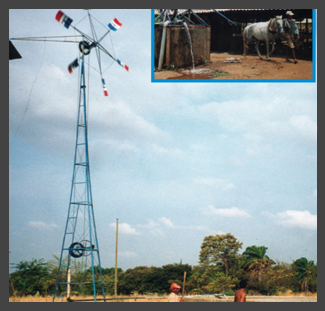Difference between revisions of "Horse and wind powered pumps"
| Line 15: | Line 15: | ||
|- | |- | ||
! width="50%" style="background:#efefef;" | Advantages | ! width="50%" style="background:#efefef;" | Advantages | ||
| − | ! style="background:# | + | ! style="background:#f0f8ff;" | Disadvantages |
|- | |- | ||
| valign="top" | - Uses renewable energy sources. <br> | | valign="top" | - Uses renewable energy sources. <br> | ||
| Line 36: | Line 36: | ||
* Horse rope pump: US$ 350. | * Horse rope pump: US$ 350. | ||
* Wind rope pump: US$ 450 - 800. | * Wind rope pump: US$ 450 - 800. | ||
| − | ==Manuals, videos, and links== | + | |
| + | ===Manuals, videos, and links=== | ||
* [http://www.ropepumps.org Rope pumps] powered with horse and wind. | * [http://www.ropepumps.org Rope pumps] powered with horse and wind. | ||
* [http://www.arrakis.nl/index.php?parent=Wind_energy&page=AT_-_Affordable_Technologies Examples of Affordable & productive Wind Pump Technologies]. Arrakis.nl | * [http://www.arrakis.nl/index.php?parent=Wind_energy&page=AT_-_Affordable_Technologies Examples of Affordable & productive Wind Pump Technologies]. Arrakis.nl | ||
<br> | <br> | ||
| − | {|style="font-size: | + | {|style="font-size: 115%" cellpadding="5" |
|-valign="top" | |-valign="top" | ||
|{{#ev:vimeo|8367311|200|auto|<center>This 50 minute movie shows how to make a windmill which powers an EMAS pump. Mobile School for Water and Sanitation.</center>}} | |{{#ev:vimeo|8367311|200|auto|<center>This 50 minute movie shows how to make a windmill which powers an EMAS pump. Mobile School for Water and Sanitation.</center>}} | ||
Revision as of 04:11, 3 October 2013
Renewable energy sources such as animal power and wind power can be used to extract water from wells.
Wind powered pumps
In several countries, low-cost windmills are used to power piston pumps. Examples include the Miramar mills in Peru, the Poldaw mills in Africa and Baptist mills in Bolivia.
In Nicaragua, windmills are combined with a rope pump. The wind rope pump has features of a modern wind pump of Dutch design (CWD 2000) and there are 300 units installed in Nicaragua, produced locally and maintained by the users. They are used for cattle watering, domestic water supply and irrigation. A recent survey indicates that the investment in a wind rope pump for irrigation can be recovered within 2-3 years.
Suitable conditions
| Advantages | Disadvantages |
|---|---|
| - Uses renewable energy sources. - Can be combined with a permanent magnet generator. |
- Sometimes the wind does not blow |
Construction, operations and maintenance
Capacity
- Horse rope pump: 120 litres/min (10 m head).
- Wind rope pump: 60 litres/min (10 m head).
Rural electricity
As an option, wind rope pumps can be combined with a permanent magnet generator to charge batteries for a few light bulbs and a television. There are also small wind generators based on the design of the wind rope pump.
Costs
(AMEC, Nicaragua)
- Horse rope pump: US$ 350.
- Wind rope pump: US$ 450 - 800.
Manuals, videos, and links
- Rope pumps powered with horse and wind.
- Examples of Affordable & productive Wind Pump Technologies. Arrakis.nl
Acknowledgements
- SmartWater Solutions Examples of innovative, low-cost technologies for wells, pumps, storage, irrigation and water treatment or (alternative link). Netherlands Water Partnership, 2006.

